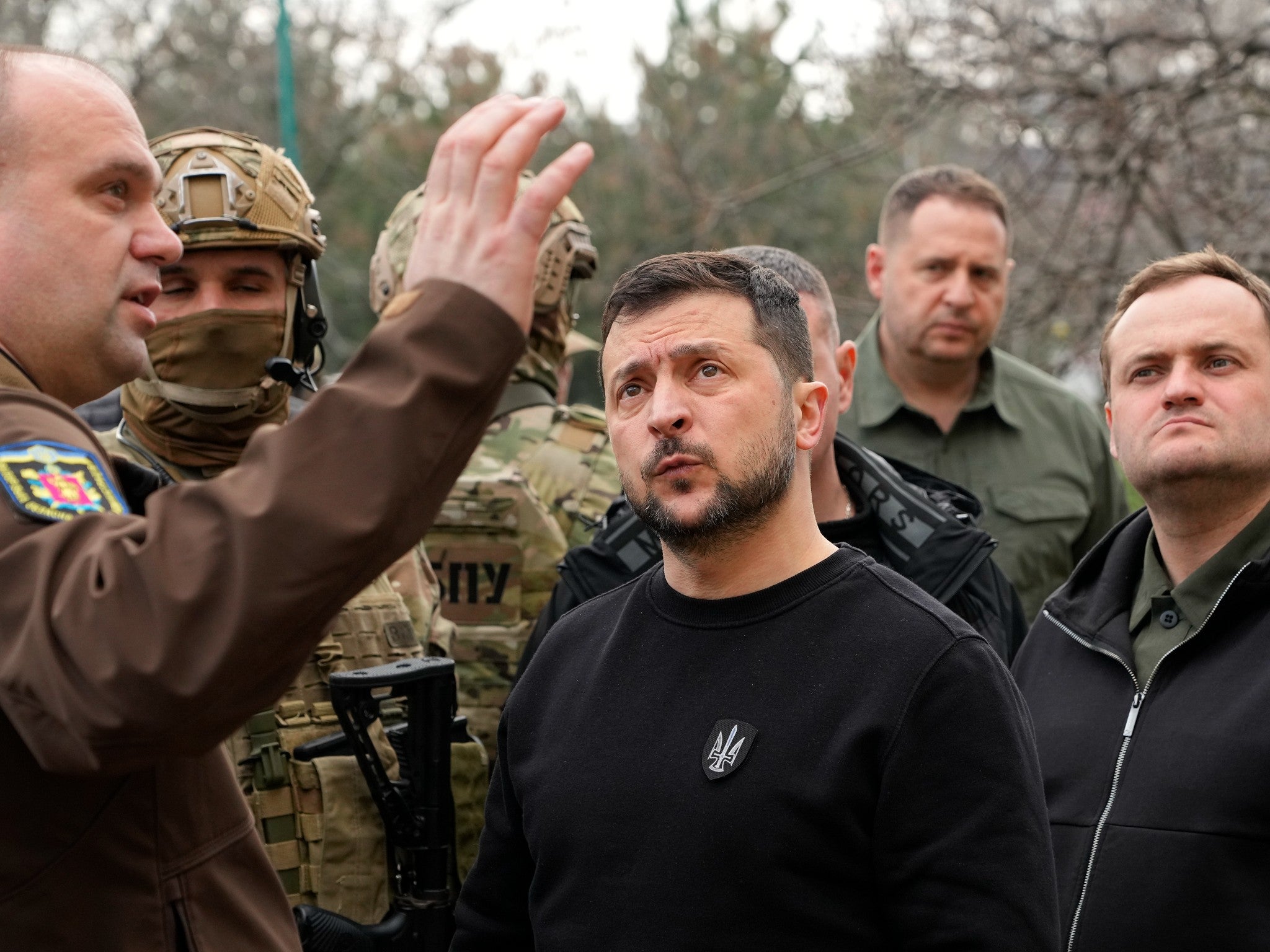Zelensky visits troops in Zaporizhzhia as part of frontline tour – and discusses nuclear safety
Visits comes after announcement from Vladimir Putin Russia had reached deal to place tactical nuclear weapons in Belarus

Your support helps us to tell the story
From reproductive rights to climate change to Big Tech, The Independent is on the ground when the story is developing. Whether it's investigating the financials of Elon Musk's pro-Trump PAC or producing our latest documentary, 'The A Word', which shines a light on the American women fighting for reproductive rights, we know how important it is to parse out the facts from the messaging.
At such a critical moment in US history, we need reporters on the ground. Your donation allows us to keep sending journalists to speak to both sides of the story.
The Independent is trusted by Americans across the entire political spectrum. And unlike many other quality news outlets, we choose not to lock Americans out of our reporting and analysis with paywalls. We believe quality journalism should be available to everyone, paid for by those who can afford it.
Your support makes all the difference.Ukraine's president Volodymyr Zelensky handed out medals to troops in southeastern Zaporizhzhia, the latest stage of his tour of frontline regions, as Kyiv’s forces seek to break the back of Russia‘s winter offensive before starting their own.
It was Mr Zelensky’s third visit to the front line in less than a week. The president also discussed nuclear safety with International Atomic Energy Agency (IAEA) chief, Rafael Grossi, who also travelled to the area, home to Europe’s biggest nuclear power plant. The plant has been occupied by Russian forces for the last year, with Kyiv having regularly raised concerns about its condition – although there is no immediate danger.
Vladimir Putin and other officials from Moscow have sought to play up the prospect of the war escalating to involve nuclear weapons and over the weekend Mr Putin said he had struck a deal to station tactical nuclear weapons in Belarus. Both Ukraine and its Western allies have reacted angrily to the announcement, with a spokesperson from the German Foreign Ministry calling the announcement “irresponsible” and “escalatory”.
“[This is] another attempt at nuclear intimidation and we consider this rhetoric to be irresponsible and expressly reject it,” Andrea Sasse told reporters in Berlin. Ukraine has called for a meeting of the UN Security Council over the announcement and Lithuania said it would call for new sanctions against Moscow and Minsk. Belarus and Russia have close military ties, and Minsk allowed Moscow to use its territory as a staging point for the invasion of Ukraine last year.
It comes following reports in German media that the 18 Leopard 2 tanks promised by Berlin to support Ukraine have been handed over at the Ukrainian border, with 40 Marder infantry fighting vehicles have also reached the country.
On the ground in eastern Ukraine, Kyiv’s troops shut the eastern town of Avdiivka – south of the city of Bakhmutl which has seen some of the most vicious fighting so far – to non-military personnel on Monday, describing it as a “post-apocalyptic” wasteland.
Ukrainian ground forces commander Colonel General Oleksandr Syrskyi, who said last week that a counterattack against Russian forces could come “very soon”, visited frontline troops in the east and said his forces were still repelling Russian attacks on Bakhmut.
Defending the small city in the industrialised Donbas region that Russia has tried to seize for months was a “military necessity”, said General Syrskyi, praising Ukrainian resilience in “extremely difficult conditions”.
“We are calculating all possible options for the development of events, and will react adequately to the current situation.”
Last week, the Ukrainian military warned that Avdiivka could become a “second Bakhmut” as Russia turns its attention there. Both towns have been reduced to rubble in fighting that both sides have called a “meat grinder”.
“I am sad to say this, but Avdiivka is becoming more and more like a place from post-apocalyptic movies,” said Vitaliy Barabash, head of the city’s military administration. Only around 2,000 of a pre-war population of 30,000 remain and he urged them to leave.
Inside Russia, residents of Kireyevsk, around 140 miles south of Moscow, told Reuters of their anger over damage from what the defence ministry said was a Ukrainian drone. The ministry said three people were injured and apartment blocks were hit. It was among the closest such incidents to the Russian capital so far.
“We were used to seeing these things only online but now we've felt it ourselves. Now we know how it is,” 62-year-old Kireyevsk resident Yuri Ovchinnikov said as Russian soldiers combed the area around the damaged buildings.
Kyiv does not officially claim such attacks and there has been no word from the Ukrainian military.
Two people were killed and 32 wounded on Monday after Russian forces fired two S-300 missiles at the eastern city of Sloviansk northwest of Bakhmut, according to regional governor Pavlo Kyrylenko. President Zelensky posted a video of smouldering debris and vowed that “Ukraine will not forgive” such attacks. Moscow denies targeting civilians.
Elsewhere, Hungary’s parliament approved a bill on Monday to allow Finland to join Nato once its application has been ratified by all 30 members of the alliance. Finland and Sweden asked to join the trans-Atlantic military alliance last year in response to Russia’s invasion of Ukraine. But the process has been held up by Turkey and Hungary.
Although Finland’s bid has now been approved, the Swedish bill is still stranded in the Hungarian parliament and has faced opposition from Turkey. The bill on Finland’s accession to the alliance passed 182 to six.
Reuters contributed to this report
Join our commenting forum
Join thought-provoking conversations, follow other Independent readers and see their replies
Comments